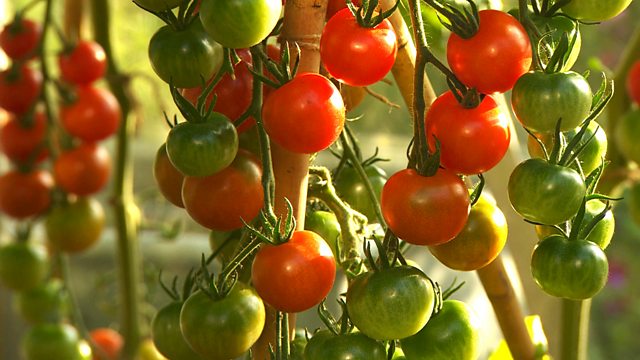
Episode 20
Gardening magazine. Carol Klein visits a walled garden in the Scottish Borders which is home to a collection of rare and unusual plants, and Monty Don has advice on cutting hedges.
Monty Don serves up an extra big helping of timely jobs to keep gardeners busy over the Bank Holiday weekend. He also makes a start on cutting his hedges, with plenty of advice on how to go about it and the right tools to use for the job.
Carol Klein steps back in time when she visits an 18th century walled garden in the Scottish Borders. It belongs to Michael Wickenden who has turned it into a very special home for his enormous collection of rare and unusual plants gathered from across the globe.
There is also a visit to a couple of allotmenteers in London who have turned their plot into a paradise. Fruit and veg aside, it's become the home to their absolute obsession for roses.
Back at Longmeadow, thrift is the order of the day when Monty shows how to take cuttings from his newly acquired penstemons.
Last on
Clips
-
![]()
Penstemon cuttings
Duration: 03:21
-
![]()
The modern plant hunter
Duration: 00:57
Hedge cutting

Late summer is the perfect time to cut hedges. There’s no risk to nesting birds now and growth has slowed down so hedges should stay neat right through autumn, winter and spring.
It’s a good idea to cut most hedges annually, especially with fast-growing species like Leyland cypress (× Cuprocyparis leylandii) as they can put on huge amounts of growth each year and soon get out of reach. Hedges of mixed native species are better cut every few years as they provide food and habitats for wildlife.
Before getting started with hedge cutting, it’s worth thinking about your personal safety so here’s a check list of things to consider:
- Warn people about your plans and ask them to stay out of the area you're working in and keep pets away too
- Wear some safety goggles and avoid loose fitting clothes
- Are you using noisy petrol cutters? If so, ear protection might be useful
- Ensure you hold the hedge cutter firmly with both hands
- Use steady movements and always work gradually up the hedge from bottom to top so that the trimmings fall away from your blade
- Move forwards along the hedge gradually to avoid having to walk backwards
- If you do need to remove any jammed cuttings ensure the machine is switched off before attempting to do so
- Remember to take breaks if you feel tired, especially if using heavy petrol machinery that causes vibration to your hands and wrists
- Take care on ladders: make sure they are in good order, erected on a level surface and that you maintain at least three points of contact with your body against the frame
- If you’re using electric cutters with a power lead, keep the cable well away from the cutting area (over your shoulder is good) and make sure it’s plugged into a socket fitted with a residual current device (RCD) to protect you from shocks if you cut through the cable. Plug-in RCD adaptors are widely available
(apps.rhs.org.uk)
Garden visited: Cally Gardens
Cally Gardens
Gatehouse of Fleet
Castle Douglas
Dumfries and Galloway
Scotland
DG7 2DJ
Μύ
Μύ(www.callygarden.co.uk)
Garden visited: George and Serge’s allotment
Golf Course Allotments
Winton Avenue
Muswell Hill
London
N11 2AS
Μύ
The Golf Course Allotment site is holding their Autumn Show on Sunday 1st September and will be open in the afternoon from 1-4.30pm; all proceeds to charity.
Μύ
For more details, go to the (www.ngs.org.uk)
Jobs for the weekend: Water camellias
Camellias, rhododendrons and azaleas are setting their flower buds for next spring and it’s important to keep them well watered, especially if they are in pots. Suffering dry conditions now can stop the buds from forming so watering will guarantee a good display next year.
Μύ
(apps.rhs.org.uk)
Jobs for the weekend: Treat pots with nematodes
Vine weevils can be a real problem for plants in pots but if you apply nematodes now it can get rid of them.Μύ Adult vine weevils cause notches on leaves but the real damage is done by the larvae feeding on the roots through autumn, winter and spring. Simply follow the instructions on the packet to dilute the nematode mix. Don’t treat the plants with notched leaves; instead water the nematodes into all pots where plants are living permanently, as these are where eggs are laid.
Μύ
(apps.rhs.org.uk)
Jobs for the weekend: Stop tomatoes
As we come to the end of August, the time left for tomato plants to form and ripen new fruit is diminishing so you should think about stopping them. Use a knife or secateurs to cut the tops off plants and don’t worry if it means removing a few flowers.Μύ This will focus the plant’s energy into swelling and ripening existing fruit.
Μύ
(www.bbc.co.uk)
Credits
| Role | Contributor |
|---|---|
| Presenter | Monty Don |
| Presenter | Carol Klein |
| Series Editor | Liz Rumbold |
| Producer | Babs Lewis |
Broadcasts
- Fri 23 Aug 2013 20:30
- Sun 25 Aug 2013 08:30


